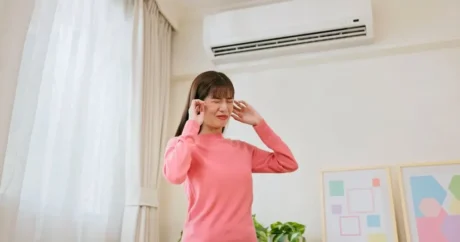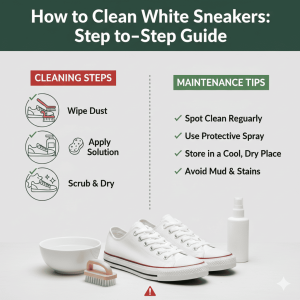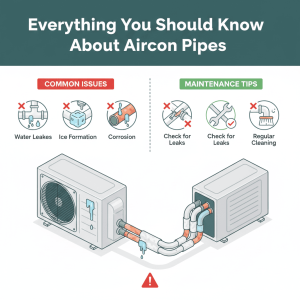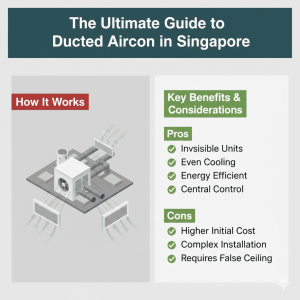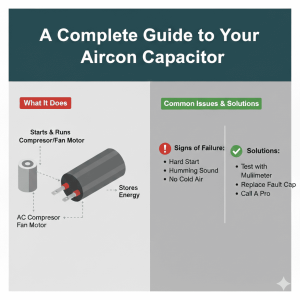Why You Shouldn’t Ignore Aircon Noises
Normal air conditioner sounds are usually quiet and consistent. Unusual, loud, high-pitched, irregular, or harsh noises indicate a problem that shouldn’t be ignored.
These warning signs of aircon can lead to higher energy bills due to malfunctions like refrigerant leaks (hissing) or duct leaks (whistling).
Addressing issues early, such as a loose part (rattling) or a failing capacitor (buzzing), is more cost-effective than waiting for major damage.
Loud screeching can mean compressor issues, banging suggests internal damage, and certain noises like buzzing (electrical issues), loud squealing (pressure buildup), and hissing (refrigerant leaks) can be safety hazards.
Recognizing problematic noises helps prevent costly breakdowns and ensures comfort and safety.
Banging Noises

What it sounds like: Banging noises from your air conditioner making loud noise typically manifest as harsh metallic impact sounds. You might describe them as clanking or knocking. These alarming sounds usually occur while the unit is running and can follow either a rhythmic pattern or happen irregularly.
The source of banging or clanking depends largely on where you hear it. From the outdoor unit, loud banging most frequently indicates problems within the compressor. Internal parts such as the piston pin, connecting rod, or crankshaft may have broken loose, striking the compressor’s housing as they move. This is particularly common in units approaching the middle or end of their expected lifespan due to natural wear and tear. An unbalanced compressor can also create these concerning sounds.
If you’re wondering “why is my ac unit making a loud noise” from either indoor or outdoor units, it might stem from fan problems. The blades of your indoor blower fan or outdoor condenser fan could be loose, bent, or unbalanced, causing them to strike the fan cage or other components during rotation. An obstructed blower fan hitting its housing will also create these alarming sounds.
Less commonly, loose debris like sticks in the outdoor unit might cause banging. The expansion and contraction of metal ductwork can sometimes create booming noises, though these typically relate to temperature changes rather than component failure. Cyclic booms might point to an unbalanced indoor blower.
The severity level for banging or clanking sounds is high. These noises almost always signal significant mechanical failure, indicating that parts are loose or broken and potentially causing escalating damage with every impact. Immediate attention is crucial to prevent catastrophic failure of expensive components like the compressor or fan motor.
For troubleshooting, homeowners can perform a basic visual inspection around the outdoor unit for obvious loose debris, though this is less likely the cause of loud banging. You might also listen to determine if the noise seems related to ductwork expanding or contracting rather than the unit itself. Crucially, you should never attempt to open the unit or inspect internal components due to safety risks and complexity.
When you hear distinct banging or clanking, the safest action is to turn your air conditioning system off immediately at the thermostat or breaker to prevent further damage. This type of noise almost invariably requires diagnosis and repair by a qualified HVAC professional. If you’re experiencing this issue, it might be a sign that your aircon compressor is not working properly and needs professional attention.
A technician will determine the exact source of the noise. Repairs might involve tightening loose components, or more commonly, replacing damaged parts. This could mean resetting or replacing unbalanced fan blades, replacing a damaged blower motor, or, frequently, replacing the entire compressor. Repairing internal compressor damage is often impractical as these units are typically sealed.
Compressor replacement ranks among the most expensive AC repairs. Blower motor replacement is also a significant investment. The location of the banging provides important diagnostic clues – outdoor banging strongly suggests compressor issues, while indoor banging typically points toward blower fan assembly problems.
Buzzing Sounds

What it sounds like: Ac making loud buzzing noise manifests as a low-frequency vibration or hum that ranges from a faint background noise to a loud, intrusive sound. The buzzing might remain constant while the unit runs, occur intermittently, or happen specifically when the unit attempts to start but fails.
If you’re wondering “why is my ac making a buzzing noise,” there are numerous potential causes, most related to electrical components or parts under strain. Electrical issues are very common sources. A failing contactor relay switch (which controls power flow to the compressor and fan) often buzzes as it wears out. A failing capacitor (which helps start motors) can cause motors to struggle and buzz. Loose electrical wiring or connections create vibrations or arcing that result in buzzing sounds. A failing circuit board can also be the culprit. Buzzing heard even when the unit isn’t actively cooling strongly indicates an electrical fault.
Motor and fan issues frequently cause buzzing too. Loose or unbalanced fan blades (condenser or blower) vibrate and buzz. A failing fan motor (either outdoor condenser fan or indoor blower motor) may buzz as it struggles or nears failure. A condenser fan motor stuck due to debris can also cause buzzing as it tries to turn.
The compressor itself might produce buzzing when malfunctioning, possibly due to electrical issues or internal wear. The small rubber isolation feet under the compressor can degrade, causing the compressor to vibrate and buzz against the unit base.
Ice formation on indoor evaporator coils or outdoor units restricts airflow and strains components like fan motors, causing them to buzz. Freezing typically signals other problems, most commonly a dirty air filter blocking airflow or refrigerant leaks. Debris lodged within indoor or outdoor units can interfere with moving parts and cause buzzing. Copper refrigerant lines vibrating against each other or another surface can also buzz. Low refrigerant levels due to leaks can cause various components to malfunction under stress, sometimes resulting in buzzing.
The severity level for buzzing ranges from moderate to high. Because buzzing frequently links to electrical problems, it carries higher risk than some other noises. Faulty electrical components can pose fire hazards. Buzzing can also indicate significant stress on major components like motors or the compressor, or a frozen system, all requiring prompt inspection to prevent further damage.
For troubleshooting, start by checking and replacing dirty air filters, which commonly cause freezing that leads to buzzing. Inspect the outdoor unit for leaves, sticks, or other debris interfering with the fan. Look for frost or ice buildup on refrigerant lines or coils. If ice is present, turn the AC mode to OFF but leave the fan setting ON at the thermostat, allowing several hours for complete thawing. Ensure the filter is clean before restarting. Check if refrigerant lines are vibrating against each other or the house; insulation may help.
If these DIY steps don’t resolve the buzzing, professional help becomes necessary. This is especially true for suspected electrical issues, motor problems, compressor issues, or refrigerant leaks. Buzzing when the unit isn’t running strongly suggests an electrical fault requiring immediate professional attention. If the unit repeatedly freezes after thawing, a technician needs to find the underlying cause, likely low refrigerant or persistent airflow issues.
Learning about the different aircon parts and their functions can help you better understand and describe issues to your technician when these problems arise.
Hissing Noises
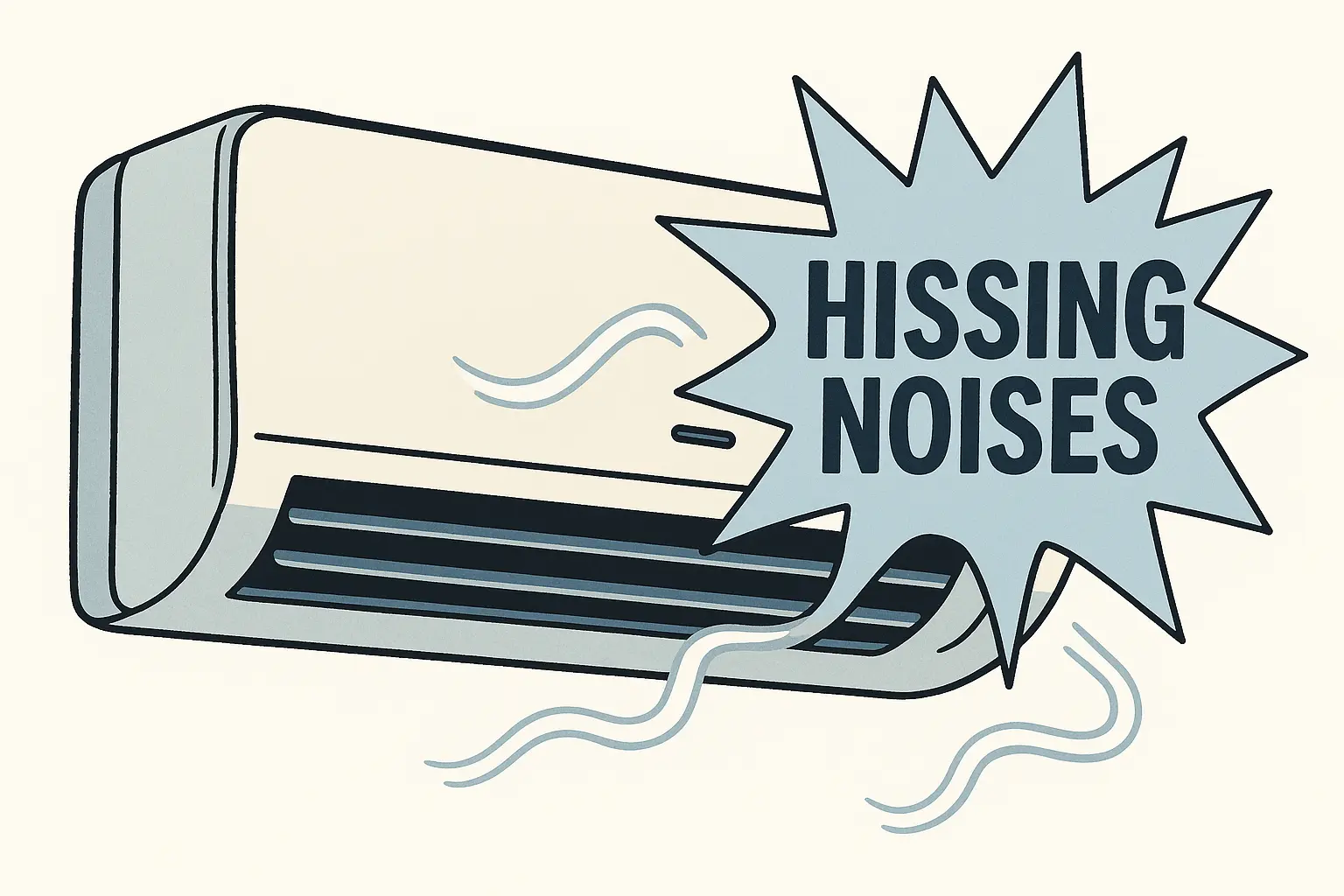
What it sounds like: Hissing from your air conditioner resembles air or gas escaping under pressure, similar to a snake hissing or steam escaping from a kettle. The sound ranges from a subtle leak to a loud, continuous hiss, sometimes accompanied by bubbling or gurgling noises.
While a few possibilities exist, one cause dominates: refrigerant leaks. This is by far the most common and serious cause of hissing sounds. The high pressure within the system forces refrigerant gas through small cracks or holes in components like copper refrigerant lines, indoor or outdoor coils, Schrader valves (used for servicing), the filter drier, the heat pump accumulator, or the expansion valve.
Air escaping through cracks, holes, or poorly sealed joints in the ductwork can create hissing or whistling sounds, particularly noticeable near vents or walls. While this wastes energy, it’s generally less severe than a refrigerant leak. A malfunctioning expansion valve, which regulates refrigerant flow, sometimes causes hissing as refrigerant passes through it improperly. Air being forced around the edges of an improperly sized or poorly installed air filter occasionally creates whistling or hissing. Less commonly, hissing might indicate excessive pressure building within the compressor, potentially preceding a louder squeal or scream.
The severity level for hissing is high. The strong likelihood of a refrigerant leak makes hissing a high-priority sound. Refrigerant leaks are hazardous to health, cause significant damage to the AC system (potentially leading to compressor failure), and drastically reduce cooling efficiency. If you suspect a leak, it’s important to understand what you need to know about aircon gas leaks before proceeding.
For troubleshooting, homeowners can check if the air filter is the correct size and properly seated. Listening carefully near vents versus near the AC units can help distinguish between potential duct leaks and system leaks. Under no circumstances should homeowners attempt to handle or repair refrigerant lines due to safety hazards and legal requirements (EPA certification).
Call a professional immediately if a refrigerant leak is suspected, which is the most probable cause of hissing. Turn off the system to prevent further refrigerant loss and potential damage. Professional help is also needed for sealing ductwork leaks or diagnosing and replacing a faulty expansion valve.
The primary repair involves leak detection using specialized tools, repairing the source of the leak (which might require patching lines/coils or replacing components like valves), and recharging the system with the correct amount of refrigerant. If the issue is ductwork, professionals will seal the leaks. If the expansion valve is faulty, it will be replaced.
Given the overwhelming association of hissing with potentially hazardous and damaging refrigerant leaks, this sound warrants immediate professional assessment by a licensed technician. While duct leaks or filter issues remain possibilities, the risk associated with refrigerant leaks makes prompt action essential.
Rattling Noises

What it sounds like: Rattling from your air conditioner creates a shaking or vibrating noise, often sounding like loose parts being shaken around inside the unit. It might also resemble something caught in the fan, similar to a playing card stuck in bicycle spokes. Rattling can originate from the indoor unit, the outdoor unit, or even the ductwork and vents.
When investigating why is my ac making noise of a rattling nature, the cause is often something being loose or obstructed. Debris represents a very frequent cause, especially for rattling in the outdoor condenser unit. Sticks, leaves, pebbles, dirt, or other debris can get inside the unit and be hit by the fan blades or vibrate against components.
General vibrations during operation can cause screws, bolts, access panels, or other hardware to loosen over time, leading to rattling. Fan blades themselves can become loose. Sections of ductwork that aren’t securely fastened can vibrate and rattle as air moves through them. The return air vent grille might also rattle if it’s loose or if its fins vibrate.
If you have a noisy ac unit with a rattling sound, it could be that the compressor is aging and beginning to fail. Loose internal compressor parts might also rattle, though banging more commonly describes this. A damaged electrical contractor has been cited as a potential cause of rattling. Parts within the blower motor assembly wearing out can cause shaking and rattling. In some specific U-shaped window AC designs, water droplets being picked up by the fan and hitting hot condenser coils create a rattling or spraying sound, often related to improper tilt.
The severity level for rattling ranges from low to moderate. Rattling frequently stems from simple, easily correctable issues like debris or loose external screws, which homeowners can often address themselves. However, persistent rattling, rattling from internal components like the blower motor, or rattling associated with the compressor can indicate more serious deterioration or electrical problems requiring professional attention.
For troubleshooting, safety comes first: always turn off power to the AC unit at the breaker box before inspecting or attempting any cleaning or tightening. Inspect the outdoor unit for leaves, twigs, rocks, or dirt buildup and remove any obstructions. Gently check exterior panels, covers, and accessible screws on both indoor and outdoor units to see if they’re loose and tighten them if necessary. Ensure return air grilles are securely fastened and that the fins aren’t vibrating excessively. For window units, check for proper backward tilt for drainage if rattling seems water-related.
If rattling persists after these DIY checks, professional diagnosis becomes necessary. Call a technician if the noise seems to come from deep inside the unit (like the blower motor), if loose ductwork is suspected, if an electrical component like the contractor is suspected, or if the compressor seems to be the source. Persistent rattling often signals that components are starting to break down and require attention.
The fact that rattling so often stems from easily remedied issues like debris or loose screws makes it a prime candidate for initial homeowner investigation (with power off). This contrasts with sounds like hissing or banging, where the most likely causes are internal, complex, or hazardous. However, because rattling can also signal the beginning of more serious mechanical or electrical failures, it shouldn’t be ignored if simple fixes don’t work.
Screeching Sounds

What it sounds like: Screeching from your air conditioner creates a distinct, high-pitched, often piercing sound. It might manifest as a continuous squeal while the unit runs or a brief but intense screech, especially during startup. An extreme version might be described as “screaming.”
This alarming sound typically points to either high friction in moving parts or dangerous pressure levels. Worn-out or insufficiently lubricated bearings in the outdoor condenser fan motor or indoor blower motor represent a very common cause. The noise results from metal components rubbing directly against each other without proper lubrication.
In older systems with belt-driven fans, a fan belt that is worn, has slipped out of alignment, or is loose can cause squealing as it moves over the pulleys. Most critically, a loud squeal or screech, particularly at startup, can indicate that internal pressure within the compressor has built up to dangerously high levels. This is often described as a “screaming” sound and poses a significant safety risk. The squealing could also stem from the impending failure of the condenser fan motor, blower motor, or the compressor motor itself.
For homeowners wondering “why is my ac fan making noise” of a screeching nature, the severity level is high. These sounds demand immediate attention. While sometimes caused by fixable bearing or belt issues, the possibility of dangerous compressor pressure buildup makes this a critical warning sound. If high pressure is suspected, the unit must be turned off immediately to prevent potential rupture or explosion.
For troubleshooting, turn off power first. For older units, visually inspect the fan belt (if accessible) for wear, damage, or misalignment. Some older motors have oil ports for lubricating bearings; if present, specific oil (like 10-weight non-detergent motor oil) can be applied carefully. However, many modern motors are sealed and cannot be lubricated by the homeowner.
Call a professional immediately. Due to the potential for dangerous compressor pressure, any loud squealing or screeching, especially if it occurs at startup or sounds like a “scream,” warrants shutting down the unit and calling a professional without delay. Professional help is required for replacing worn bearings or entire motors, diagnosing and addressing compressor issues, and replacing belts if DIY adjustment isn’t possible or doesn’t solve the problem.
The potential for severe hazard associated with compressor pressure issues elevates squealing/screeching to a high-priority warning, even though simpler causes like lubrication or belt adjustments exist. The risk outweighs the potential for a simple fix, making immediate shutdown and professional assessment the recommended course of action. A useful diagnostic clue: screeching only at startup often points to the compressor, while continuous screeching more likely indicates a fan motor issue.
Clicking Sounds
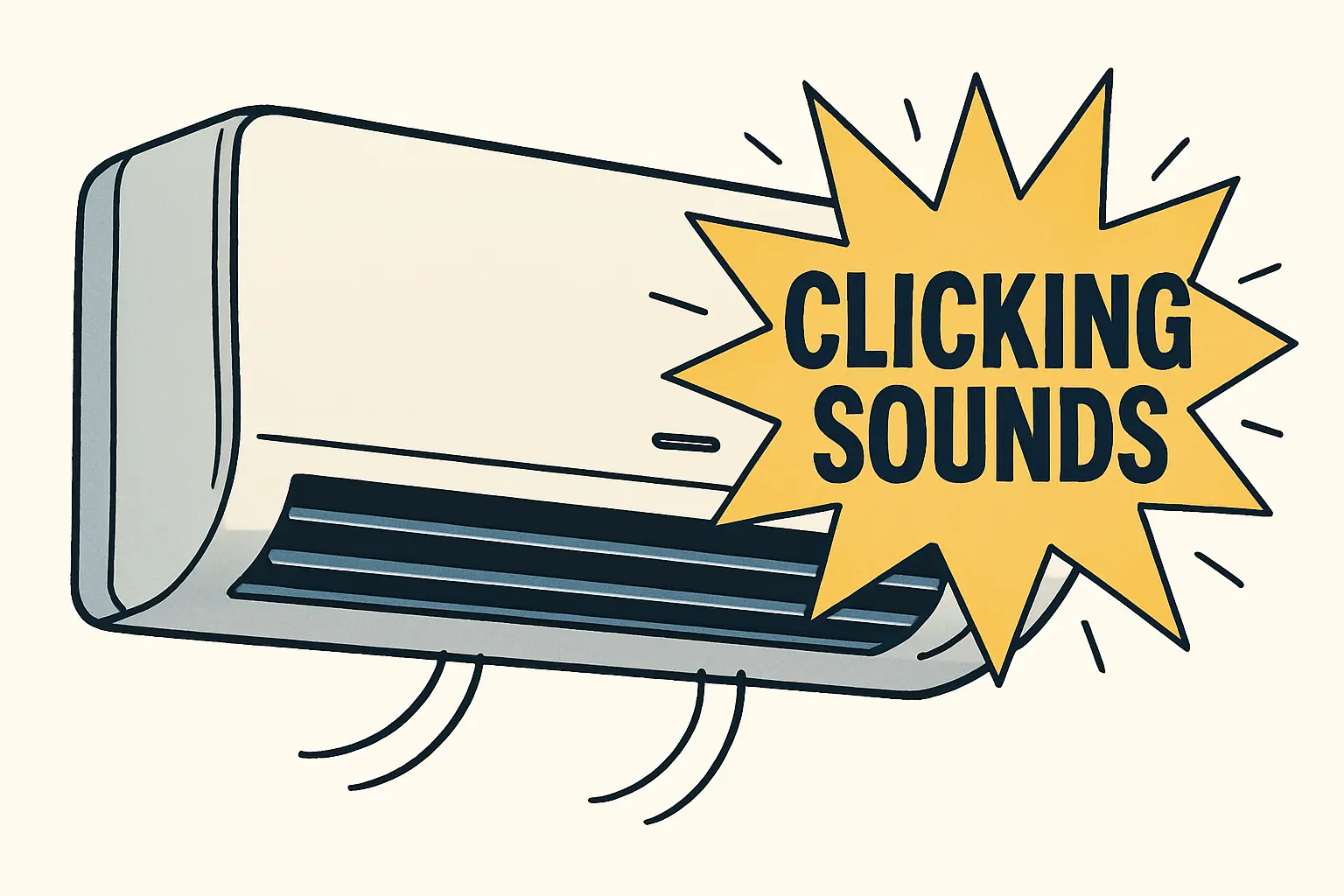
What it sounds like: Persistent clicking from your air conditioner manifests as a repetitive sound that continues during the cooling cycle or occurs frequently, distinct from the normal, isolated clicks heard when the system turns on or off. The clicking might be fast or slow, steady or irregular.
Persistent clicking predominantly associates with electrical control components. A failing thermostat commonly causes this issue, potentially sending faulty signals. A malfunctioning relay switch (which turns components on/off) or contactor can stick or chatter, causing clicks. A failing capacitor might also cause clicking as it struggles to provide power. A defective control panel or circuit board can lead to erratic signals and clicking. General electrical problems, like loose connections or shorts, can also manifest as clicking. Short cycling (the system turning on and off too frequently) can also produce clicking sounds.
If you’re experiencing ac fan noise that sounds like clicking, small debris like twigs or leaves hitting the fan blades might be the cause. A loose or unbalanced fan could potentially create this sound. In some cases, clicking heard from the outdoor unit might indicate a problem with the compressor starting or failing.
The severity level for persistent clicking is moderate. While occasionally caused by minor fan obstructions, persistent clicking usually signals problems within the AC’s electrical control system. These issues need professional diagnosis to prevent further component damage, inefficient operation, or complete system failure.
For troubleshooting, turn off power first. Visually inspect the outdoor fan for any obvious small debris caught in the blades and remove it carefully. Check the thermostat to ensure settings are correct and consider replacing batteries if applicable.
Professional help becomes necessary if the clicking is persistent, repetitive, occurs throughout the cycle, or seems clearly electrical in nature. This includes suspected issues with the thermostat, relays, capacitors, control board, or compressor.
The strong correlation between persistent clicking and electrical control malfunctions makes this noise a clear indicator that professional diagnosis is needed. Unlike mechanical rattles often caused by debris, clicking points to the system’s “brain” or power delivery components, requiring specialized knowledge to repair safely and correctly.
Bubbling Sounds

What it sounds like: Gurgling or bubbling from your air conditioner sounds similar to liquid bubbling or water running where it shouldn’t be. This distinctive noise can sometimes occur alongside a hissing sound.
Gurgling or bubbling noises typically indicate issues with either condensation removal or the refrigerant itself. Condensate drain line problems represent a very common cause. As your AC cools, it removes moisture (condensate) which normally flows away through a drain line and often a P-trap. If this line becomes blocked with algae, sludge, or debris, or if it’s cracked or damaged, water can back up, causing gurgling or bubbling sounds as air and water struggle to pass. In some setups, particularly if the drain line connects to plumbing, a dry P-trap can allow air to be sucked back into the unit when the fan runs, creating a gurgling or sucking sound.
Air or moisture entering the sealed refrigerant system due to a leak can cause bubbling or gurgling noises as the contaminated refrigerant circulates through lines and components. This often accompanies other signs of a leak, like hissing or reduced cooling performance.
For those with a split ac blower fan making noise that sounds like bubbling, the severity level is moderate. While often caused by a relatively simple drain line clog, this issue needs attention. A blocked drain can lead to water overflowing the drain pan, causing water damage to surrounding areas like ceilings or floors and potentially promoting mold growth. If the cause is a refrigerant leak, the severity increases due to potential system damage and reduced efficiency.
For troubleshooting, check the drain pan near the indoor air handler and see if it contains standing water, indicating a blockage downstream. Find where the condensate drain line exits (usually outside near the condenser unit or into house plumbing) and check if water drips freely when the AC runs. Look for visible kinks or blockages at the outlet.
If an access point (like a cleanout tee) is available on the drain line near the air handler, carefully try pouring a cup of water, or a diluted solution of vinegar and water or bleach and water, down the line to clear minor sludge or algae buildup. Use caution with bleach. If the system has an accessible P-trap in the drain line, pouring water into it can restore the water seal and potentially stop gurgling caused by air suction.
If DIY clearing methods don’t resolve the gurgling, if the blockage seems severe or inaccessible, or if the drain line itself appears cracked or damaged, professional help becomes necessary. If gurgling accompanies hissing sounds or significantly reduced cooling, a refrigerant leak is likely, requiring immediate professional service.
Gurgling or bubbling sounds signal that liquid (either condensate water or refrigerant) isn’t flowing correctly. While condensate drain issues are frequent and sometimes fixable with DIY methods, the potential for water damage or the possibility of a more serious refrigerant leak means the noise should be addressed promptly.
Silence is Golden: Preventing AC Noises with Maintenance

Many disruptive air conditioner making loud noise issues don’t arrive as sudden failures but develop gradually from wear and tear exacerbated by neglected maintenance. Neglect allows dirt to accumulate, moving parts to lose lubrication, components to loosen, and filters or drains to clog. These conditions strain the system, directly causing many common noises like rattling, buzzing, squealing, and gurgling. Consistent preventative maintenance therefore becomes key to quieter, more efficient, and longer-lasting operation.
The single most important DIY maintenance task involves changing or cleaning air filters regularly. Dirty, clogged filters severely restrict airflow, forcing the system to work harder and potentially causing the indoor coil to freeze, leading to buzzing, dripping noises, and poor cooling. Check filters monthly and replace or clean them every 1-3 months during cooling season, or more often in dusty environments or homes with pets.
Keeping the outdoor condenser unit clear represents another essential homeowner task. The outdoor unit needs unrestricted airflow to release heat effectively. Regularly clear away leaves, grass clippings, dirt, and other debris that accumulates around and inside the unit. Trim bushes, weeds, and foliage to maintain at least two feet of clearance around the unit. Obstructions can cause ac condenser making loud noise issues and strain the system.
Periodically inspect the condensate drain line outlet to ensure water flows freely when the AC runs. Minor blockages at the exit point can sometimes be cleared carefully. Regularly pouring a cup of diluted vinegar or specialized AC drain treatment down the line (if accessible) helps prevent algae and sludge buildup that causes gurgling and overflows.
For window units, check the seal between the unit and window frame at the beginning of cooling season to ensure it’s tight and prevents cool air loss.
Professional maintenance addresses issues homeowners cannot typically handle. An annual inspection and tune-up by a qualified HVAC technician is crucial for preventing major problems and associated noises. Understanding the different types of aircon services can help you choose the right maintenance schedule for your system.
If your ac blower making noise problems persist, technicians can check refrigerant levels and pressure, as low levels from leaks cause hissing, gurgling, freezing (buzzing), inefficiency, and potential compressor damage. They lubricate moving parts like motor bearings to prevent the friction that leads to squealing and grinding noises. They tighten electrical connections and check voltage to prevent buzzing, clicking, intermittent operation, and electrical hazards.
Professional maintenance also includes inspecting fans, motors, and belts for damage or imbalance that could cause rattling, banging, squealing, and buzzing. Technicians check accessible ductwork for leaks or damage that cause whistling and hissing. They thoroughly clean the condensate system, including the drain pan and line, to prevent clogs, gurgling, and water damage. They verify proper operation of controls and thermostat to ensure the system runs correctly and safely.
Combining consistent homeowner attention to basic tasks like filter changes and keeping the outdoor unit clear with annual professional maintenance addresses both immediate and deeper potential issues. This comprehensive approach ensures your system operates as quietly and efficiently as possible throughout its expected lifespan.
Listen to Your AC, Keep Your Cool

Your air conditioner rarely fails silently. The various noises it makes, from subtle clicks and hums to alarming bangs and screeches, communicate its operational status and potential problems. While the gentle hum of normal operation reassures you, unusual or loud ac unit sounds should never be ignored. They provide important signals about your system’s health and safety.
When you’re confronted with ac making weird noise situations, this guide helps you better understand common AC sounds, identify potential issues based on noise type and location, and perform basic preventative checks. However, the complexity of HVAC systems and potential hazards involved, particularly with electrical components and refrigerants, cannot be overstated. Safety should always be your priority. While you’re now empowered to perform simple checks like inspecting filters or clearing debris, recognizing the limits of DIY intervention and knowing when to call a qualified HVAC professional is equally important.
Ultimately, maintaining a quiet, efficient, and reliable air conditioning system requires proactive attention. Regularly performing simple maintenance tasks and investing in annual professional tune-ups prevents many noise-inducing problems from developing initially. Addressing unusual sounds promptly, rather than hoping they disappear, prevents minor issues from escalating into costly breakdowns or dangerous situations.
If you find yourself asking “why is my ac making a weird noise” despite your best maintenance efforts, it’s time to seek professional help. By listening to your AC and taking appropriate action, you ensure continued comfort, efficiency, safety, and peace of mind throughout the cooling season. For professional help with any of these issues, consider booking professional aircon services to keep your system running smoothly and quietly.
Your air conditioner is talking to you, now you know how to listen and respond.
